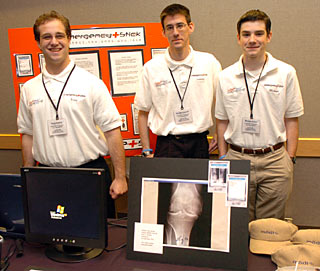REDMOND, Wash., May 5, 2006 – Tony Valenti, Jeremy Capello and Michael Knipp have a dream, one that is very personal.
Each has family members facing health issues, including both of Capello’s parents. His dad has diabetes, and his mother has multiple sclerosis.
So the three Nebraska residents came together to develop an idea that they feel will not only affect those closest to them, but provide a benefit for people all over the world.
It’s called the Emergency Stick, a microchip bracelet that can hold critical medical history and provide emergency, real-time feedback about recommended treatments. The bracelet, an encrypted USB device, is compatible with PDAs, cell phones, Tablet PCs and desktop computers.
“Anyone can benefit from this, from an elderly person with an extensive medical history to a kid with a peanut allergy,” says Valenti.
Valenti and his colleagues will have a chance to demonstrate their idea this week at the U.S. Finals of the Microsoft Imagine Cup, held at the Microsoft campus in Redmond, Washington. Now in its fourth year, the Imagine Cup is the world’s premier student technology competition. It is designed to show students the real-world opportunities that are available through technology, and to have them develop projects that have practical applicability.
Imagine Healthier Lives via Technology
The theme of this year’s Imagine Cup is to “Imagine a world where technology enables us to live healthier lives.” That premise, and Valenti’s past experience as an Imagine Cup participant, provided the impetus for the trio to begin work on the Emergency Stick. They formed a team called Digital Plasma, and are representing the University of Nebraska – Omaha in the competition.

University of Nebraska-Omaha students (L-R) Tony Valenti, Jeremy Capello, Michael Knipp developed a microchip medical-information bracelet as their entry in Microsoft’s 2006 Imagine Cup technology competition. Redmond, Wash., May 5, 2006.
Originally, the Emergency Stick was designed for the elderly to help provide doctors, paramedics and family members with access to critical health information in an emergency. The team, however, was quick to realize their device has a much broader impact – a health bracelet version is for the elderly and children, a PDA version is for the traveling professional, and a “dog tag” version is available for military personnel. The product can even remind someone when to take their medication. The software was developed using Microsoft technology and .NET Web services.
Knipp’s grandfather is suffering from diabetes, so he and his family understand how the Emergency Stick can play an important role in his care.
“I really like the fact that it is going to help people, and it will help my family personally too,” he says.
The Imagine Cup has grown from just 1,000 students worldwide at its inception to the more than 65,000 participating in 2006 – representing more than 100 countries. Digital Plasma is competing against 13 other software design teams, where the U.S. champion will win US$8,000 and advance to the global finals this August in New Delhi, India.
Additional schools represented in this year’s U.S. competition include: the University of Washington, Northeastern University, Virginia Commonwealth, Fresno State, East Tennessee State, Bradley University, the University of Texas-Arlington, University of Southern California, Carnegie Mellon University, West Virginia University, and a dual entry from Virginia Tech / Christopher Newport University.
For the first time, Microsoft has supported the Imagine Cup with broadcast advertising as part of its widely seen “Realizing Potential” campaign.
Parlaying Championship into Opportunity
Last year’s U.S. champions, Team LiNK from Virginia Commonwealth University, developed a handwriting education system for the Tablet PC, geared toward the early-childhood classroom as well as foreign language and ESL instruction. They have parlayed their Imagine Cup success into numerous opportunities.
“As a group we’ve been able to display our education system on several occasions, from corporations to politicians, to university officials,” says James Barrett, one of the Team LiNK members. “My Imagine Cup experience has given me the understanding that an open mind is a great asset in any venture, and values like teamwork and collaboration are necessary to attain future goals.”
The Digital Plasma team has also enjoyed their Imagine Cup experience, and hope that they will get a chance to compete at the global finals. No matter the outcome, however, they believe in the Emergency Stick and how it can impact people’s lives.
“This device can be used throughout the entire world,” says Capello. “Something like this could be really beneficial to my Mom and Dad too.”




